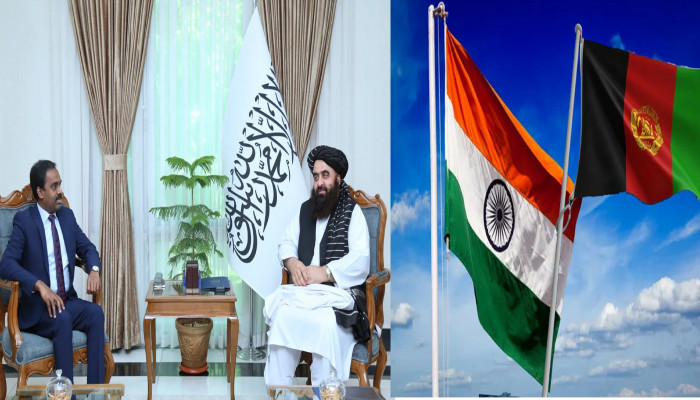India, Taliban hold talks in Kabul amid heightened regional tensions after Pahalgam terrorist attack
- In Reports
- 04:57 PM, Apr 29, 2025
- Myind Staff
India recently held talks with the Taliban-led government of Afghanistan, marking a significant change in diplomatic relations. The discussions took place against the backdrop of rising tensions between India and Pakistan following a terror attack on tourists in Jammu and Kashmir's Pahalgam on April 22.
Anand Prakash, Joint Secretary in India's Ministry of External Affairs, met with Afghanistan's acting Foreign Minister Mawlawi Amir Khan Muttaqi in Kabul. The talks covered various topics, including the changing regional situation, as well as issues like political relations, trade, and transit routes between the two countries. Tensions have risen between New Delhi and Islamabad after the terrorist attack in Pahalgam on April 22, which resulted in the deaths of 25 tourists and one local resident. India has accused Pakistan of being responsible for the attack and has taken several diplomatic actions, such as suspending the Indus Waters Treaty and cancelling visas. In response, Pakistan has also implemented similar measures, including the potential suspension of the Simla Agreement.
During discussions in Kabul, Afghanistan's Foreign Minister, Muttaqi, expressed Afghanistan’s interest in expanding its diplomatic and economic relations with India. He highlighted Afghanistan’s investment-friendly environment and encouraged Indian businesses to explore the opportunities there. Afghanistan’s Ministry of Foreign Affairs did not directly mention the Pahalgam attack but acknowledged that “recent regional developments” were part of the conversation.
“During the meeting, both sides held discussions on strengthening bilateral political relations, enhancing trade and transit cooperation, and exchanging views on recent regional developments,” read the statement. The Taliban government condemned the recent terror attack, saying that such events harm efforts to maintain regional security and stability. Taliban Foreign Ministry Spokesman Abdul Qahar Balkhi expressed his condolences to the families affected by the attack.
Although the Taliban government has not been internationally recognised, India has kept a diplomatic presence in Kabul since the Taliban took power in August 2021. India’s representative, Prakash, expressed hope about strengthening relations in various sectors and confirmed India's commitment to development cooperation. He also highlighted India's interest in resuming stalled infrastructure projects from the past. India's recent approach represents a shift in its stance toward Afghanistan. After the fall of Kabul, India had to pause its diplomatic and development activities, which included significant investments in Afghanistan’s democracy, such as military training programs, scholarships, and the construction of the Afghan Parliament building. The abrupt halt led to increased influence from regional rivals, particularly Pakistan and China. In January, there were signs that India's foreign policy towards Afghanistan may be adjusting. Foreign Secretary Vikram Misri met with Taliban representative Muttaqi in Dubai, marking the highest-level meeting between the two since 2021.
During their discussions, the Taliban expressed a strong desire to enhance political and economic relations with India, recognising it as a "significant regional and economic power." The talks also explored the possibility of increasing trade through Iran’s Chabahar port—a key infrastructure project that India has heavily invested in. This would allow goods to bypass Pakistan’s ports in Karachi and Gwadar.
According to Ajay Darshan Behera, Professor, MMAJ Academy of International Studies, Jamia Millia Islamia University, New Delhi, India's limited engagement with Taliban without officially recognising the government can keep "communication lines open and help prevent Afghanistan from becoming a sanctuary for anti-India terror groups". He adds, for India, " the goal is not to embrace the Taliban, but to ensure Afghanistan does not turn into a geopolitical vacuum exploited by hostile forces".







Comments